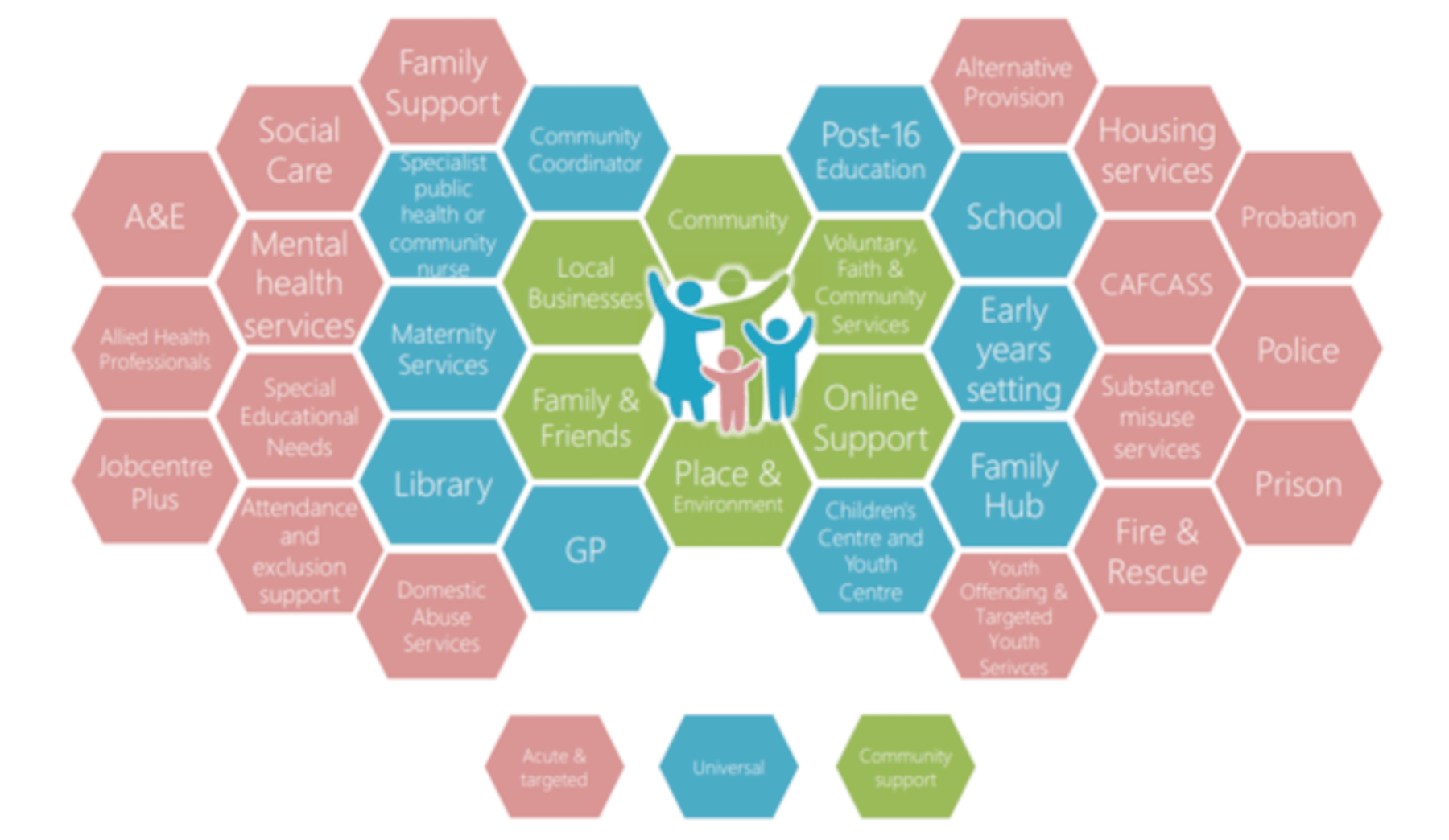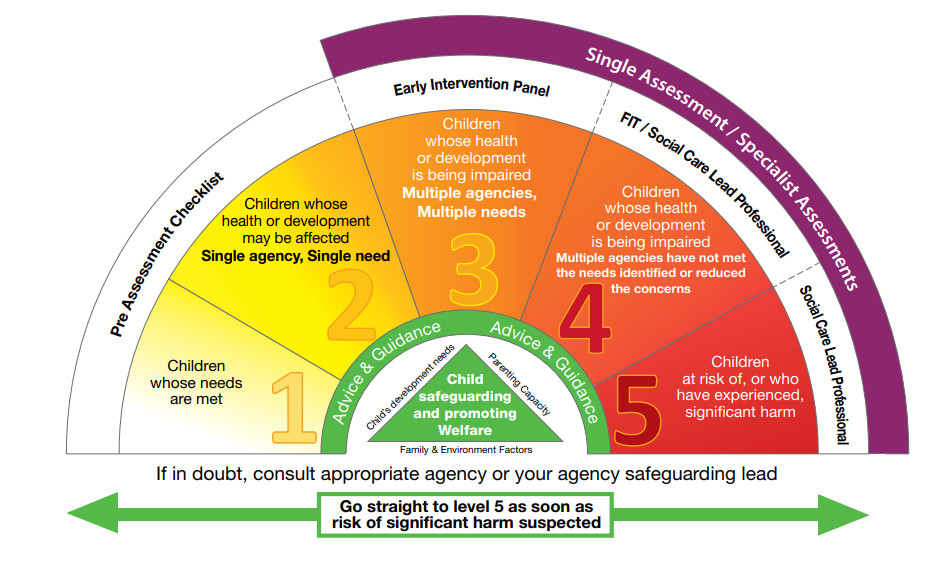Supporting Families: Early Help

In this article, former headteacher Sara Rawnsley reflects on the systems in place designed to support children and families who fall below social care thresholds and asks, 'What is Early Help'?
It is estimated that over two million children in the UK today are living in difficult family circumstances.
”Preventative services can do more to reduce abuse and neglect than reactive services.“
In my career of some 20 years as a senior leader and headteacher in schools, I have encountered so many families who are vulnerable or who are struggling to cope but who didn't meet the thresholds of social care need. This led to me feeling a constant sense of frustration, fear for their safety and wellbeing as well as a sense of hopelessness, not knowing what to do to help and support them.
So, in 2018 I welcomed the introduction of the then new inter-agency working guidance, Working Together to Safeguard Children . This guidance highlighted the need for 'Early Help', a system designed to be more effective in promoting the welfare of children proactively, providing support as soon as problems emerge, at any point in a child's life, from the foundation years through to the teenage years.
For the first time there was a documented statutory expectation for local areas to have:
a comprehensive range of effective, evidence-based services in place to address assessed needs early. The early help on offer should draw upon any local assessment of need, including the JSNA (Joint Strategic Needs Assessment) and the latest evidence of the effectiveness of early help programmes.”
This placed a statutory duty on local authorities to establish effective ways to identify emerging problems and potential unmet needs of individual children and families and to work with organisations and agencies to develop joined-up early help services based on a clear understanding of local needs. This requires all practitioners, including those in universal services and those providing services to adults with children, to understand their role in identifying emerging problems and to share information with other practitioners to support early identification and assessment.
In addition, Section 10 of the Children Act 2004 sets out the legal framework for multi-agency 'cooperation to improve well-being'. Each local authority must 'make arrangements to promote cooperation' between the authority and its partners' with a view to 'improving the well-being of children' and 'with regard to the importance of parents and other persons caring for children' in improving their well-being.
This methodology of supporting families came from the HM Government 'Troubled Families Programme', launched in 2011. The programme had a simple, but clear principle - effective support for vulnerable families cannot be provided in an uncoordinated, transactional way, which sees only problems rather than people. That way fails to comprehend the entirety of a family's life, resulting in an escalation of problems, poor outcomes often perpetuated across generations, and unmanageable flows into reactive, statutory systems, which is overwhelming for public services and costly for society as a whole.
The programme was designed as an innovation to tackle this systemic problem. It committed to ensuring that vulnerable families had a single point of contact, a person who would build a relationship with them, understand the root causes of their problems, and support each member of the family to make positive changes. For families, this meant someone was there for them at the most challenging point in their lives, helping them make sense of problems, navigate specialist support, and ultimately take action to build a more positive future. This approach, known as 'whole family' working, builds on pre-existing successful models of family support.
In March 2021, the programme was renamed 'Supporting Families' supported by local authorities and was allocated funding. This is expressed as a maximum allocation as funding consists of both advance payments and payment by results for achieving successful outcomes with families, which is unlocked when local authorities evidence these outcomes have been achieved. Local areas gained local flexibility to define specific indicators of need and progress in local “Troubled Families Outcomes Plans”, enabling authorities to both identify the right families to work with and the outcomes they need to thrive.
What is the Early Help System?
Early Help is the term used to describe arrangements and services that respond to the needs of children, young people and their families as soon as problems start to emerge at any point in their lives, or when there is a strong likelihood that problems will emerge in the future. Section 10 of the Children Act 2004 requires each local authority to make arrangements to promote cooperation between the authority, each of the authority's relevant partners, such as Early Help Police or health visitors and other persons or bodies working with children in the local authority's area as the authority considers appropriate. A strong Early Help System is made up of many different types of practitioners and services who operate as one. Schools are an integral part of this process and this interventive practice is fundamental to providing support to those children and families who need support but don't meet the threshold of need for social services involvement.
Key features of effective Early Help are:
- A multi-disciplinary approach that brings a range of professional skills and expertise to bear through a 'Team Around the Child, Young Person / Family';
- A relationship with a trusted Lead Practitioner who can engage with the child / young person and their parents and family (mother and father figures and extended family), and coordinate the support needed from other agencies;
- Practice that empowers families and helps them to develop the capacity to resolve their own problems;
- A holistic approach that addresses a child's / young person's needs in a wider context;
- Simple, streamlined enquiry and assessment process and response.

Continuum of Need
All local authorities have a Continuum of Need which is aimed at every agency, statutory, voluntary, private and independent which works directly or indirectly with children, young people and families. The purpose of this guidance is to help agencies identify a child's degree of need and respond appropriately - “the right help, right time”.
The core function of a continuum of need document is that it includes:
- The process for the early help assessment and the type of level of early help services to be provided.
- The criteria, including the level of need, for when a case should be referred to local authority children's social care for assessment and for statutory services under: Section 17 of the Children Act 1989 (Child in Need) - Section 47 of the Children Act 1989 (reasonable cause to suspect children suffering or likely to suffer significant harm); - section 31 (care orders); and - Section 20 of the Children Act 1989 (duty to accommodate)
- Clear procedures and processes for cases relating to Child Exploitation including sexual exploitation of children and young people (working together 2018)
The Children Act necessitates an assessment process where priorities of need can be identified and each local authority will have a published process, shared with all services.

- Level 1
- represents children with no identified additional needs. Their needs are met through accessing universal services.
- Level 2
- represents children with additional needs that can be met by targeted support by a single practitioner or agency - universal services.
- Level 3
- represents children with additional needs that can be met by targeted support by a multi-agency integrated support package - mainly universal services coordinating their approach.
- Level 4
- represents children with significant additional needs that have not been met following a co-ordinated, multi-agency response from the Early Intervention Panel and for whom significant concerns remain. This is when Children's Social Care may become involved.
- Level 5
- represents children with complex needs at the highest level of vulnerability which will be met by multi-agency support from specialist services (Social Care will always be the lead professional when a child protection enquiry is necessary, S47).
If a child or family are identified as needing to receive Level 3 or sometimes called 'Universal Plus' i.e. where health or development is being impaired by a range of unmet needs and where an integrated response from a number of agencies and support systems is necessary to achieve an improvement in outcomes, then an Early Help Assessment (EHA) needs to be completed.
Early Help Assessment (EHA)
In recent years, the Common Assessment Framework (CAF) was replaced by an Early Help Assessment (EHA). The EHA is based on the same principles as the CAF, but it is much simpler and more straightforward to use.
An EHA is an initial assessment and planning tool that facilitates and coordinates multi-agency support. It assesses the situation of the child or young person and their family and helps to identify the needs of both the children and the adults in the family. Early help is voluntary and consent from children, young people and their families to work with them should always be sought.
It is a shared tool that multiple agencies can use to develop a coordinated response. This improves involvement between agencies and ensures that the child and their family are getting all the support that they need from wherever they need it. By doing this, the assessment aims to resolve any problems in their early stages and therefore removes the need for the intervention of social care.
From this assessment, a single agency early help plan is developed with the family. Progress and plans are reviewed with the family. A worker is identified to lead and coordinate the plan (the Lead Practitioner), which is developed with the family and agreed with other agencies. Progress is reviewed with the family and the Team around the Family (TAF).
The Lead Practitioner
The Lead Practitioner is the named professional, identified as the person who will be the family's main point of contact whilst they need a coordinated Early Help package of support. They will be one of a number of practitioners already working with the family. The Lead Practitioner could be any one of the following roles but is not limited to: a teacher, a health professional, a Police Officer, a Housing Officer, a Family Support worker or a voluntary or community sector worker. Within schools, this role is often fulfilled by a member of school staff such as the Designated Safeguarding Leader (DSL).
The lead practitioner should always be the right person for the family at the right time, with the family having a say in who takes up this role. In some circumstances, specific professional groups or voluntary community service (VCS) organisations may have greater involvement as a lead practitioner or as part of the team around the family following needs or risk assessment or because of specific contracting arrangements.
Lead Practitioners play a key role in the effective frontline delivery of services for vulnerable children with a range of additional needs. They are vital in ensuring that support is well coordinated, resources are used effectively and good early decision-making leads to better outcomes for both children and their families. There should be effective supervision processes in place by a manager to ensure lead practitioners are supported in their role where there is direct work carried out with families.
Early Help Coordinator
Most families who need some additional support will achieve positive outcomes through an Early Help Assessment and Plan. However, where the family and the team are struggling to make progress to achieve outcomes, the skills of an Early Help Coordinator can be drawn upon.
Early Help Coordinators work alongside Lead Practitioners and others in universal services offering:
- Consultation
- about individual children and families using the Continuum of Need and Risk Tool, Signs of Safety® methodology and supporting the Lead Practitioner to analyse evidence when children's needs have not been met through the plan.
- Co-working
- supporting Lead Professionals with information sharing to enable a good quality assessment to be completed, co-chairing initial meetings, or supporting a TAF if required (for example where there are disagreements, or where progress is not being made).
- Coaching
- through face-to-face meetings to ensure that assessments and plans are SMART, and meet the needs of the whole family; acting as a role model for effective practice that relies on assertive, persistent, time-bound and challenging style of casework;
- Collaboration
- to co-design bespoke packages of support, guidance and practical tools to support practitioners when working with families;
- Consistency
- by quality-assuring multi-agency Early Help plans and providing feedback to the Lead Practitioner and their manager.
So, five years on we must ask ourselves...
”are these systems working?“
Find out in my next article, which will be published here 4th April 2023.
Sara Spinks
SSS Author & Former Headteacher
27 March 2023